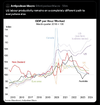JohnDe
La dolce vita
- Joined
- 11 March 2020
- Posts
- 4,903
- Reactions
- 7,298
being a Tradesman in Mining for the past 20 years, i can tell you that the mining companies havent trained any one for the past decade, when the work place industerial laws changed under Rudd, it was similar to Howards just re branded, it alowed compamnies to0 go away from enterprise agreements and abuse causal labour, the the completion rates for apprentices now days is low and people staying in the trades is low also & rther majority of apprentices they put on are to tick boxes
You can say that for every trade; a shortage of tradespeople because of a lack of apprentices completing their trade.
In the 1980's anyone in a trade was shunned as poorly educated, only the university educated could earn a decent living.
The rot started in the early 1990's. the recession that we had to have caused several years with business not signing up apprentices, which lead to a large downturn in numbers at TAFE colleges, and then funding cuts by state governments.
In the early 2000's the governments opened up trades training to all sorts of organisations, some very good and some very bad.
And then the mining boom hit, taking a large amount of the good and badly trained trades people. Not such a bad thing, because many came back better trained.
Finally, all the governments became aware of the dire need for more tradespeople. New rules for training centers were introduced, increased funding to TAFE's, monetary incentives for business and apprentices given. governments and unions got together and started big infrastructure builds with big wages, drawing in large numbers of workers and apprentices.
Covid threw a spanner in the works, work slowed due to government quarantine laws, and they gave money away like lollies. Covid ended and the flood gates opened to immigration, more people came into Australia than houses had been built during the shutdown. With consumer bank accounts full and shortages of goods to buy, prices went up.
Governments across the country continued to increase the number and size of infrastructure builds. Cost was not on the agenda; wages matched the increase on builds that went over budget. All for the greater good, they told us.
Now we find that Australia has reached a crossroad, and the most important decision in generation is which road do we take.
The apprentice issue is slowly being sorted, recruiting of young people for certain trades is now decided by education and counseling at high school with teachers and industry. More apprentices are staying in the trade, the quality of the tradespeople coming out of colleges has increased, wages and lifestyle are better.
However, we still have the problem of large government infrastructure builds and mining wages drawing away newly qualified trades people, which adds to the circle of labour shortage-immigration-inflation-inequality.
Governments across the country need to work together in the planning and implementation of infrastructure builds, so as not to put the rest of the workers in private industry under pressure. And governments need to get tougher with militant unions, like the builders and stevedoring unions.
But that's not going to happen. Australia is now too socialist for any change like that. Governments will continue to waste tax dollars, large businesses will pay for peace and cause high prices for everyone, taxes will continue to go up, and voters will take it because they are addicted to the welfare tit.
We are witnessing a new normal.




